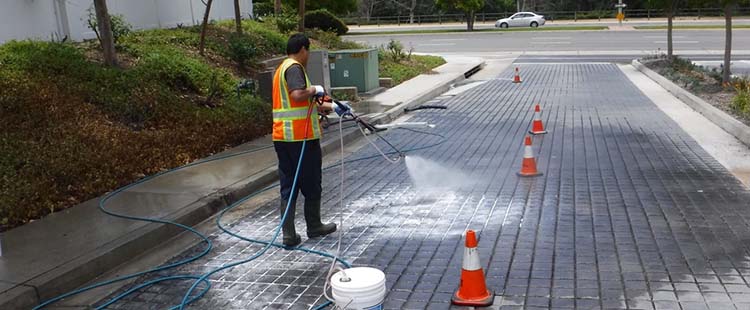
When it comes to growing a successful power washing business, residential work is great — but commercial contracts are where steady income and big growth really begin. 🧼💼
From office buildings to strip malls to industrial complexes, commercial clients need consistent cleaning to maintain appearances and comply with safety regulations. But to land (and keep) those lucrative jobs, you need more than just a pressure washer — you need a clear, professional, and airtight contract. 📑
In this article, we’ll break down the best practices for creating and managing commercial power washing contracts that protect your business, satisfy clients, and build long-term partnerships. Let’s get started! 👇
💡 Why Commercial Contracts Matter So Much
Unlike one-time residential jobs, commercial power washing often involves:
- Larger surfaces 🏢
- Specialized cleaning (e.g., grease, graffiti, or oil removal)
- Recurring service schedules 📅
- More liability and higher expectations
That means the stakes are higher — and the contracts should reflect that.
An effective contract:
- Sets clear expectations ✅
- Minimizes scope creep ❌
- Protects you legally ⚖️
- Shows clients you’re a professional worth hiring 💼
Let’s walk through what it takes to build a great one.
🧱 Essential Elements to Include in Your Contract
Here’s a breakdown of what every solid commercial power washing contract should include:
1. Scope of Work 📋
Spell out exactly what services are being provided, including:
- Type of cleaning (surface, soft wash, hot water, etc.)
- Specific areas to be cleaned (sidewalks, siding, dumpster pads, etc.)
- Frequency (one-time, weekly, monthly, quarterly)
- Add-ons or exclusions (e.g., “roof not included”)
🔍 Be as detailed as possible to prevent misunderstandings.
2. Schedule of Services 📆
Include clear timing:
- Start and end dates
- Frequency of recurring services
- Time of day work will be done (e.g., before or after business hours)
- Weather-related rescheduling policies 🌧️☀️
3. Payment Terms 💳
Avoid payment disputes by including:
- Pricing structure (flat fee, hourly, per square foot)
- Payment schedule (deposit, net-15, net-30, etc.)
- Late payment fees or penalties
- Accepted payment methods
Example: “Invoices are due within 15 days of receipt. Payments not received within 30 days are subject to a 5% late fee.”
4. Liability and Insurance 🛡️
You MUST include clauses that protect your business. Specify:
- That your company is fully licensed and insured
- Any limits to your liability
- That you’re not responsible for pre-existing damage
- Procedures if accidental damage occurs
5. Client Responsibilities 🚧
Hold the client accountable, too. This could include:
- Clearing vehicles or obstructions before service
- Securing pets or employees during off-hours cleaning
- Providing water access (if applicable)
Pro tip: Outline any fees if these responsibilities aren’t met.
6. Cancellation and Termination Policy ❌
Things change — protect yourself with clear cancellation terms:
- Notice required for cancellations
- Early termination fees
- Grounds for termination (non-payment, unsafe conditions, etc.)
7. Dispute Resolution Clause ⚖️
To avoid legal headaches, include how disputes will be resolved:
- Through mediation or arbitration
- In a specific local jurisdiction
- With both parties agreeing to cover their own legal fees
8. Signature and Date Lines ✍️
It may seem obvious, but both parties need to sign the contract.
- Include printed name, signature, title (if applicable), and date
- Make sure all pages are reviewed before signing
🛠️ Pro Tips for Writing and Presenting Contracts
Now that you know what to include, here’s how to make your contracts work for you — and not against you.
✅ Use Clear, Simple Language
Avoid overly technical or “legalese” language. Your goal is clarity, not confusion.
✅ Customize for Each Client
Don’t rely solely on templates. Tailor the scope, pricing, and terms to each job.
✅ Review With the Client
Before signing, walk them through the key points:
“Just to confirm — we’ll be servicing the storefront and back dock biweekly, with payment due on the 15th of each month. We’ve included a small fee for after-hours service, and everything is outlined here in Section 3.”
This builds trust and prevents surprises. 🤝
✅ Keep Digital and Hard Copies
Use e-sign tools like DocuSign or PandaDoc for convenience, and save backup copies of every signed agreement.
📊 Don’t Forget the Estimate
Even if your commercial clients are used to contracts, many still expect an upfront estimate. Provide a clean, itemized estimate that reflects:
- Square footage
- Surface type
- Labor required
- Frequency discounts (e.g., 10% off for quarterly cleaning)
- Any travel or setup fees
🧾 Bonus tip: Include photos of similar past jobs to show results.
🔁 Offer Maintenance Contracts
Recurring contracts = recurring revenue. 💰
Offer service plans such as:
- Monthly sidewalk cleaning
- Biannual exterior building wash
- Quarterly dumpster pad cleaning
- Seasonal parking lot pressure washing
These services keep you top of mind and reduce slow seasons. Create a pricing package that rewards loyalty, like:
“Sign a 12-month cleaning contract and get one month free!”
🧽 Final Thoughts
Commercial power washing contracts can take your business to the next level — but only if they’re done right. A handshake agreement may be fast, but it leaves room for conflict, confusion, and lost income.
When you take the time to create clear, professional, and fair contracts, you:
- Establish trust
- Set realistic expectations
- Protect your business
- Show you’re serious about your craft
Whether you’re bidding on a retail plaza or a warehouse facility, a strong contract isn’t just paperwork — it’s your ticket to lasting, profitable relationships. 🏢💦💼
Browse Amazon Here For Top Rated Power Washers And Accessories






